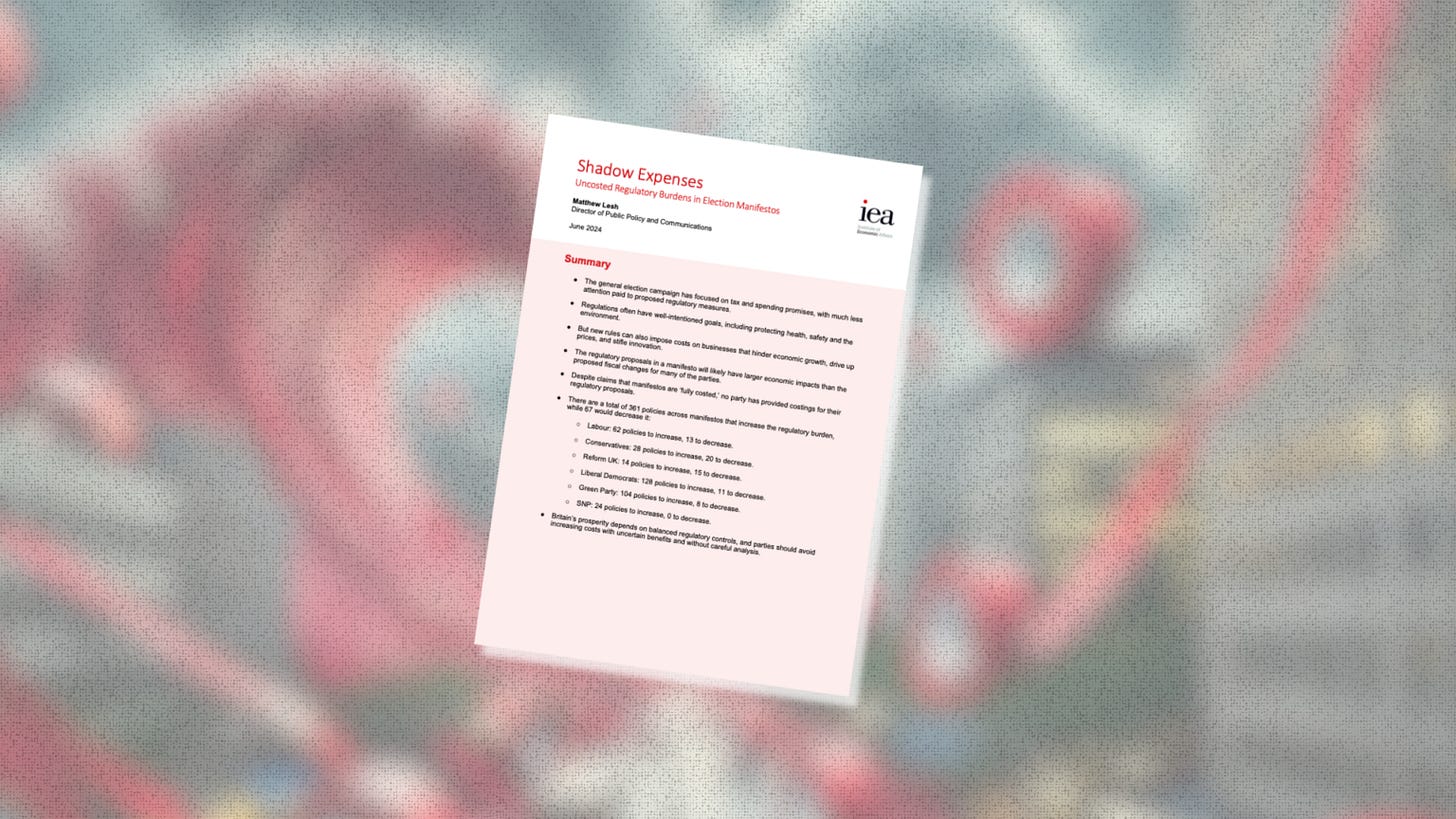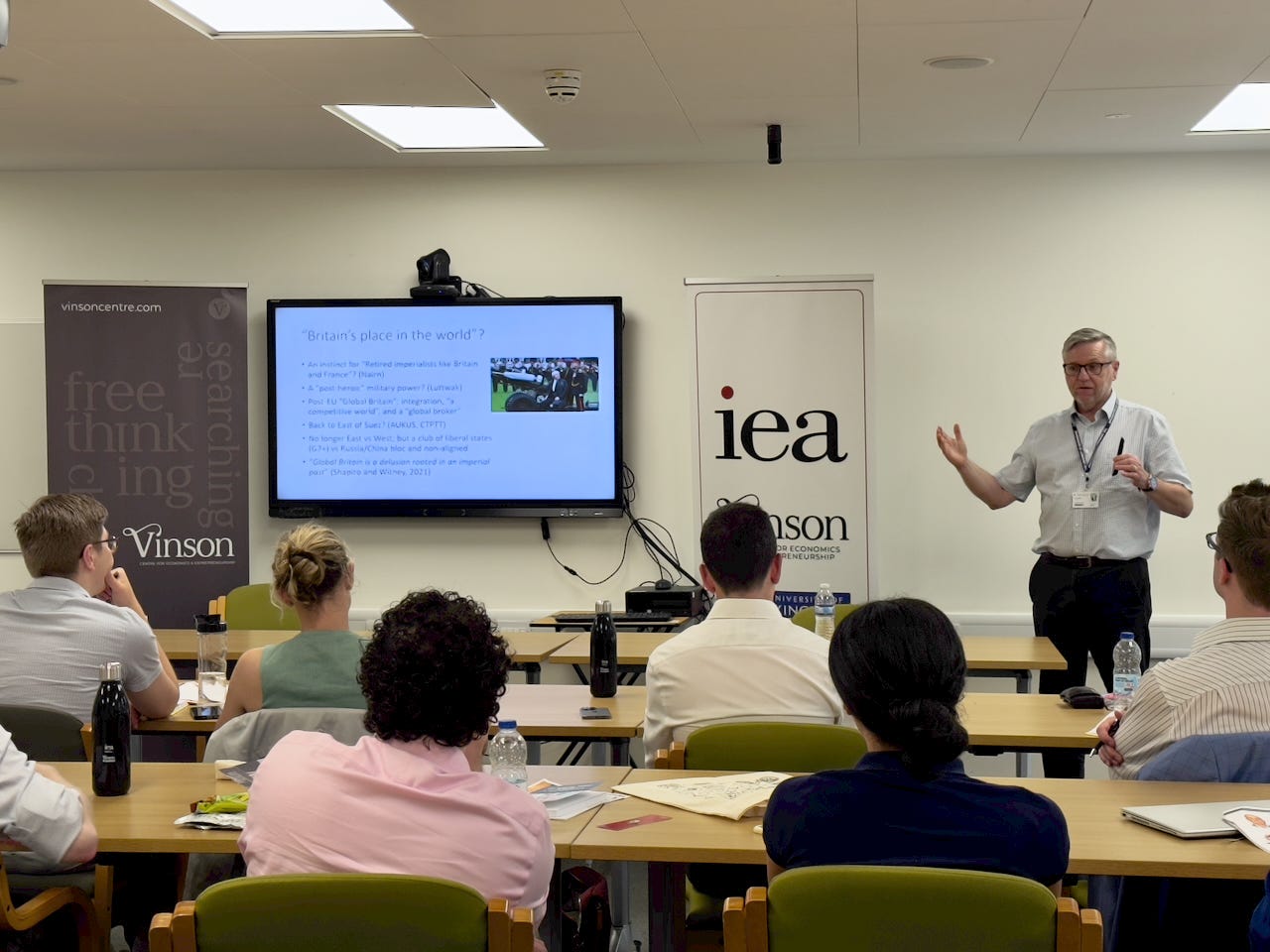Manifestos tied up in red tape
The party manifestos are full of regulatory surprises, a new IEA briefing highlights
Labour’s manifesto is a tough read — and not just because it contains some questionable ideas. It’s that rather than listing each policy proposal in bullet point form; it interweaves significant new ideas with rhetorical aspirations.
Just take this one paragraph:
“Security also means having a secure roof over your head. That is not the case for too many renting their homes privately. Labour will legislate where the Conservatives have failed, overhauling the regulation of the private rented sector. We will immediately abolish Section 21 ‘no fault’ evictions, prevent private renters being exploited and discriminated against, empower them to challenge unreasonable rent increases, and take steps to decisively raise standards, including extending ‘Awaab’s Law’ to the private sector.” [emphasis added]
It contains several motherhood and apple pie statements, followed by four specific regulatory changes and two further broad commitments (e.g., overhauling the regulation and decisively raising standards).
It struck me, from reading Labour’s manifesto, that commentators were paying relatively little attention to these sorts of commitments. There were rightly a lot of questions raised about Labour’s tax pledges, which are set to increase revenues by £8.6 billion. Yet, it seemed nobody was asking about the cost implications of all their regulatory proposals. In fact, despite claims of ‘fully costed’ manifestos, no party has provided costings for their new regulatory measures.
This discovery led me to begin cataloguing all the regulatory commitments across manifestos. This week, the IEA released the fruits of this work in a new briefing paper. There are hundreds of plans to increase regulation. This includes 62 regulatory increases from Labour, 28 from the Conservatives, and 128 from the Liberal Democrats.
This was not just some esoteric task. It could have big implications for Britain’s future. Regulation may have well-intentioned goals, such as protecting health, safety and the environment. But it can also impose costs on businesses that hinder economic growth, drive up prices, and stifle innovation. Just one proposal, mandating higher energy standards in privately rented homes, would cost £12.2 billion, according to a government impact assessment.
Regulatory plans could also be a good news story, particularly proposals to reform the planning system to drive up economic growth. But if the parties fail to even bother to analyse the costs and benefits of their plans, we could all be in for some nasty surprises in the years ahead.
Matthew Lesh
Director of Public Policy and Communications
p.s. If you want to support this sort of important research, our offer to new subscribers (which includes a copy of Steve Davies’ new book Apocalypse Next: The Economics of Global Catastrophic Risks) is still available:
Shadow Expenses: Uncosted Regulatory Burdens in Election Manifestos
Manifestos contain 361 policies to increase regulatory burden, with just 67 to decrease it.
Labour proposes 62 policies to increase regulation, Conservatives 28, Liberal Democrats 128.
No party has provided costings for their regulatory proposals, despite claims of ‘fully costed’ manifestos.
New regulations are likely to have larger economic impacts than proposed fiscal changes.
Regulation can be necessary, but it also risks higher prices, lower wages and stifled innovation.
Mountain of red tape will cost consumers and business billions, Shadow Expenses featured in The Daily Express (p.6 & 7), The Times (p.42), The Daily Telegraph (p.19), Guido Fakwes, Luxurious Magazine
Let’s be honest, all regulation – even hedgehog holes – costs public money, Matthew Lesh, City AM (p.18)
The real cost of red tape, Daniel Freeman, CapX
The party manifestos fail to take into account the cost of new regulations, Reem Ibrahim, GB News
The Hidden Tax: How Election Promises Will Cost Businesses Billions, Matthew Lesh, IEA YouTube
News, Views & Upcoming Events
On Ukraine, Nigel Farage is at a moral and political dead end, Managing Editor Daniel Freeman, CapX
Farage on Ukraine & Does Neoliberalism Lead to Populism?, IEA Podcast, Tom Clougherty, Matthew Lesh and Daniel Freeman, IEA YouTube
Are taxpayer subsidies for art moral? Head of Lifestyle Economics Christopher Snowdon, BBC Radio 4’s Moral Maze
Economic Affairs: Volume 44, Number 2, June 2024
The latest edition of Economic Affairs includes original articles on monetary system stability, institutional development, and popular perceptions of the rich.
A review of the election manifestos: the labour market, IEA Editorial & Research Fellow Len Shackleton, IEA Insider
Sir Vince Cable & Lib Dems Debate the Controversial 'Orange Book': 20 Years Later, Tom Clougherty interviews former Business Secretary Sir Vince Cable, Liberal Democrat Peer Baroness Kramer, and former Liberal Democrat MP Mark Oaten, IEA YouTube
Gamble-gate has been blown out of all proportion, IEA Head of Lifestyle Economics Christopher Snowdon, Spiked
Join us for our next Book Club event with University of Exeter historian Marc-William Palen to discuss his new book, Pax Economica: Left-Wing Visions of a Free Trade World. Marc-William is a historian at the University of Exeter.
Join the next Economic Affairs research workshop in Madrid this December, giving the unique opportunity for scholars to discuss the process of writing and publishing papers in academic journals.
Location: Universidad Francisco Marroquín, Madrid, Calle de Arturo Soria, 245, 28033 Madrid, Spain.
Date: December 13-14, 2024
Are you interested in learning more about the University of Buckingham's online MA in Political Economy by Research? The course is run by Editorial & Research Fellow Professor Len Shackleton and Vinson Centre Director Dr Juan Castaneda for students with a strong interest in the history of economic ideas and the application of economics to questions of public policy. Drop by the IEA to learn more:
Date: 11th July
Time: 5:30 - 6:30
Location: 2 Lord North Street, SW1P 3LB
LevelUp, Objective Standard Institute
Last week, IEA team members headed across the pond to the Objective Standard Institute’s LevelUp Conference. We spoke to students and young people from across the world about our work and handed out IEA primers — short introductions to the core ideas of liberty
Learn more about IEA Primers here.
Parliamentary Researchers Symposium, the University of Buckingham & the Vinson Centre
Earlier this week, fourteen current and aspiring parliamentary staffers participated in an IEA programme at the University of Buckingham. In collaboration with the Vinson Centre, the annual Parliamentary Researchers’ Symposium offered attendees a comprehensive understanding of pressing issues facing Britain’s policymakers, including the housing crisis, low productivity growth, and national security.
Reflecting on the experience, one participant remarked:
It was great to meet a group of people interested in free market ideas and discuss each of these policy areas while hearing from experts in these fields.



















Who was that twisting Chris S’s words on the Moral Maze and trying to place a wholly illogical inference on them?
I’m 100% with Chris. I enjoy many of the art forms that lady listed; but they are the icing on the cake of my life, not the essentials and I don’t expect anybody else to have to contribute to them. And if they can’t survive based on the patronage they can secure from voluntary paying customers or sponsors then they should wither away.